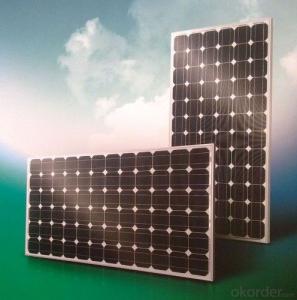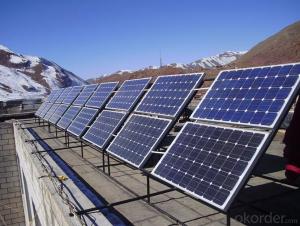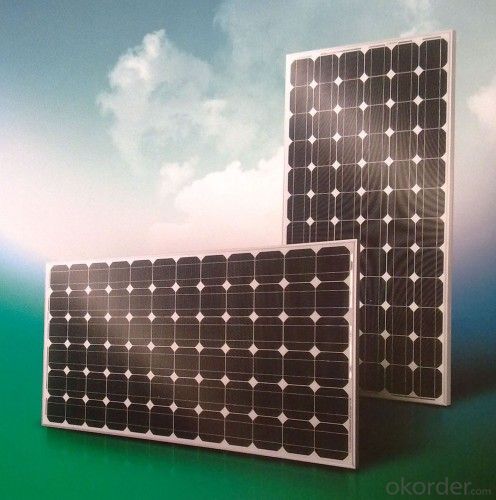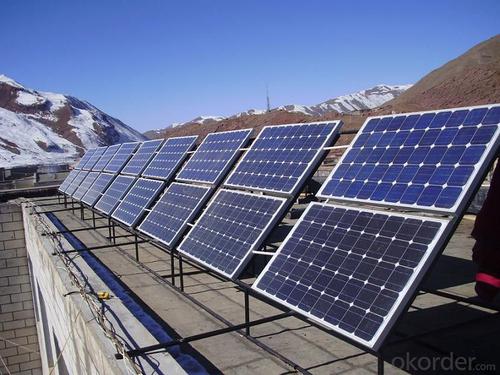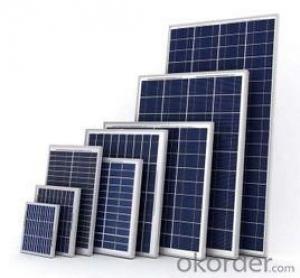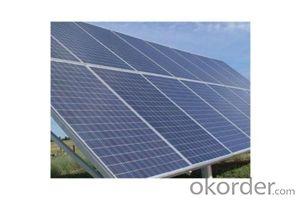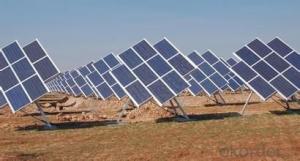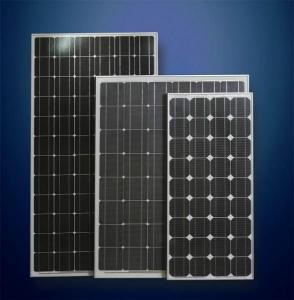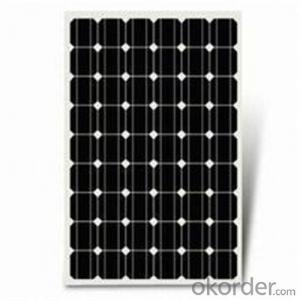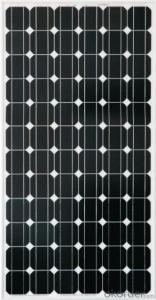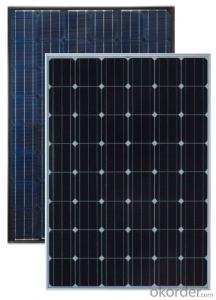50 Watt Gallium-Doped Monocrystalline PV Modules 200W
- Loading Port:
- China main port
- Payment Terms:
- TT OR LC
- Min Order Qty:
- 100000 watt
- Supply Capability:
- 10000000 watt/month
OKorder Service Pledge
OKorder Financial Service
You Might Also Like
Specification
About us
CNBM International Corp, established in 2004, is the business entity for trade and logistic of CNBM Group.With the advantages in Cement, Composite Materials, New Building Materials and Engineering, CNBM mainly concentrate on coal, steel and construction equipments and give priority to solar and wind energy development.CNBM International is highly recognized by its business partners and clients all over the world and has established good business relationship with the customers in over 120 countries and regions all over the world.
Mono Crystalline PV Modules
Solar Cells:72(6*12)
SIZE:1580*808*35mm
Weight:16.0kg
Warranty
provides a 1~3 year limited warranty (“Warranty”) against defects in materials and workmanship for its Uninterruptible power supply, Power inverter/chargers, Solar charge controllers, Battery Products (“Product”).
The term of this Warranty begins on the Product(s) initial purchase date, or the date of receipt of the Product(s) by the end user, whichever is later. This must be indicated on the invoice, bill of sale, and/or warranty registration card submitted to MUST-Solar. This Warranty applies to the original MUST-Solar Product purchaser, and is transferable only if the Product remains installed in the original use location.
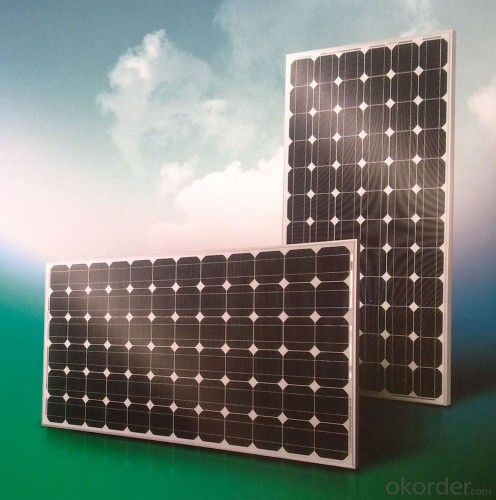
FAQ
1. How long will my inquiry get response?
Your inquiry related to our products or prices will be replied within 24 hours.
2. Can I get professional service and suggestion?
Well-trained and experienced staffs to answer all your questions in fluent English.
3. Do you accept OEM or customized design?
OEM & ODM, any your customized lightings we can help you to design and put into product.
4. What if I need specific design?
Distributorship are offered for your unique design and some our current models.
- Q: Any recommendation for best solar panels?
- I have 3 ARCO solar panels and a wind generator on the Boat and it's all I need to live comfortably on 2 volts.
- Q: solar panel capacity, how do it work
- Solar panels are made of solar cells.Solar cells are mainly made of a semiconductor called silicon,when sunshine on it,solar energy is converted into electrical energy by photovoltaic.The energy knocks electrons loose, allowing them to flow freely.This flow of electrons is a current, this current, together with the cell's voltage (which is a result of its built-in electric field or fields), defines the power (or wattage) that the solar cell can produce.
- Q: Can solar panels be installed on a library or educational institution?
- Yes, solar panels can be installed on a library or educational institution. In fact, many libraries and educational institutions are increasingly adopting solar energy systems to reduce their carbon footprint, lower energy costs, and promote renewable energy education. Installing solar panels on rooftops or open spaces of these buildings can provide clean and sustainable electricity, benefiting both the institution and the environment.
- Q: Can solar panels be installed on a condominium or apartment building?
- Yes, solar panels can be installed on a condominium or apartment building. However, it may require certain considerations such as the availability of suitable roof space, permissions from the building owners or management, and potential impact on other residents. Additionally, installation and maintenance costs may need to be shared among tenants or considered in the building's budget.
- Q: I have 2 20 watt Solar panel. I have it hooked up to solar controller and batteries to inverter. Am trying to figure out how much watts am getting. I found the voltage but how do I find the amp reading on a mutimeter?
- It is possible your meter does not have the capacity to safely measure more than 300 milliamps which is too small to measure current output from solar panels. Assuming no losses in the system or components, if your meter does not have the capacity to measure 0 Amps, you will need to get one that does. Analogs are better than digitial for this. Most often the 0 Amp circuit of the meter has a discrete positive plug location for the positive test lead. Most have a common ground connection with the rest of the meter functions. If you are measuring current at the battery in the charge mode- Negative lead of meter goes to positive terminal of battery and positive lead of meter goes to the cable that was connected to the positive terminal of the battery. Since the Wattage is a nominal measurement, if you measure between the panel and controller, take measurement on one leg of the panel, as you want to measure the current with the loaded active circuit. Meter is oriented the same way as the measurement at the battery would be made above only this time the meter is between the panel and controller. At peak solar conditions, expect current to be measured at 2.5 to3 Amps or more per panel. Under optimal conditions your panel will have higher output than their ratings indicate. Open circuit can be close to 20 volts. Never short circuit the output of the solar panels. It is volts multiplied by amps that gives you Watts.
- Q: Do solar panels require batteries?
- No, solar panels do not require batteries. They generate electricity directly from sunlight and can be connected to the electrical grid to supply power or utilize net metering to offset energy consumption. However, batteries can be used to store excess energy for later use when solar generation is low or during power outages.
- Q: Can solar panels be used to power a school?
- Yes, solar panels can definitely be used to power a school. Solar panels are a sustainable and renewable source of energy that can generate electricity by harnessing the sun's energy. By installing solar panels on the roofs or grounds of a school, it is possible to generate enough electricity to power various electrical systems within the school, including lighting, heating, cooling, and other appliances. This can not only help reduce the school's reliance on non-renewable energy sources but also lead to significant cost savings in the long run.
- Q: How do solar panels impact the local job market?
- Solar panels have a positive impact on the local job market as they create new employment opportunities in the renewable energy sector. The installation, maintenance, and manufacturing of solar panels require skilled workers, which leads to job growth and economic development in the community. Additionally, the transition to solar energy promotes a shift towards clean energy sources, attracting more investments and creating a sustainable job market for the future.
- Q: Are there any noise or sound-related issues with solar panels?
- No, solar panels do not produce any noise or sound-related issues. They work silently and efficiently, converting sunlight into electricity without creating any disturbance or noise pollution.
- Q: Can solar panels be used for powering electric gates?
- Yes, solar panels can be used to power electric gates. Solar panels convert sunlight into electricity, which can be stored in batteries or directly used to power various devices, including electric gates. This allows for a sustainable and environmentally friendly way to operate electric gates without relying on traditional electrical grids.
Send your message to us
50 Watt Gallium-Doped Monocrystalline PV Modules 200W
- Loading Port:
- China main port
- Payment Terms:
- TT OR LC
- Min Order Qty:
- 100000 watt
- Supply Capability:
- 10000000 watt/month
OKorder Service Pledge
OKorder Financial Service
Similar products
Hot products
Hot Searches
Related keywords
